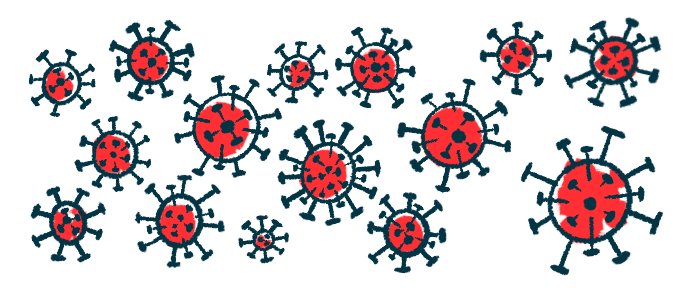AAV patients on rituximab respond poorly to COVID-19 vaccination
Nearly three-fourths of patients fail to mount effective immune response
Written by |

Nearly three-quarters of ANCA-associated vasculitis (AAV) patients treated with rituximab fail to mount an effective immune response against SARS-CoV-2, the virus that causes COVID-19, following two doses of vaccines.
That’s according to data from the U.K.-based OCTAVE trial, which evaluated immune responses to vaccines in patients with reduced immune system activity due to either the nature of their disease or immunosuppressive treatment.
The findings, reported in “SARS-CoV-2-specific immune responses and clinical outcomes after COVID-19 vaccination in patients with immune-suppressive disease,” in Nature Medicine, add to previous studies that underscore an association between the immunosuppressive therapy rituximab and poor responses to COVID-19 vaccines with AAV.
“The OCTAVE study has demonstrated which patients may remain at greater risk of [COVID]-19 despite vaccination and where we need to focus further efforts to find ways to protect the most vulnerable groups in society,” Thushan de Silva, MD, PhD, one of the study’s authors at the University of Sheffield, said in a university press release.
The findings offered reassurance “that the majority of our immunocompromised patients in the U.K. have been protected from severe [COVID]-19 by the vaccination program,” said Iain McInnes, MD, PhD, the lead trial researcher and the vice-principal and head of University of Glasgow’s College of Medical, Veterinary and Life Sciences.
Vaccines work by training the immune system to recognize a specific invader. They do this by triggering the production of antibodies that recognize a particular protein in a virus or bacterium. They also induce a immune cell-based “memory” of the invader, allowing a faster and more potent immune response in case there’s a re-infection.
Low rate of response to vaccine with AAV
Population studies have shown that people on immunosuppressive therapy, the mainstay of AAV treatment, had a higher risk of severe COVID-19 and death — the reason vaccination was urged for these at-risk populations.
Follow-up studies have reported a suboptimal response to vaccines in those with certain chronic diseases or receiving immunosuppressive treatment. “In general, these studies have focused on specific disease [groups] and few have robustly evaluated cellular immune responses,” the researchers wrote.
The OCTAVE (Observational Cohort Trial-T-cells Antibodies and Vaccine Efficacy in SARS-CoV-2) study measured real-time immune responses after two doses of a COVID-19 vaccine in 2,881 patients treated with an immunosuppressive therapy or with chronic disorders that affect the immune system.
These included 35 AAV patients on rituximab (sold as Rituxan, with biosimilars available). The therapy works by killing B-cells, an immune cell that produces antibodies, not only those that fight infections, but those involved in the abnormal immune responses that drive AAV and other autoimmune diseases. The study included 236 healthy people who served as controls.
Recruitment was conducted in 20 hospitals across the U.K. from 2021 to mid-2022, thereby including those infected with the Alpha, Delta, and Omicron strains.
The participants most commonly received two doses of the Oxford/AstraZeneca vaccine: 65% in the whole population and 94% in the AAV group. The remaining 6% of AAV patients were given the BioNTech/Pfizer mRNA vaccine.
First, the researchers assessed the capacity of patients to produce antibodies against SARS-CoV-2 in response to the vaccines.
Consistent with preliminary data, results showed 99% of healthy controls had anti-SARS-CoV-2 antibodies, but most patient groups showed lower rates of antibody positivity, with the AAV group showing the lowest (28%).
Compared with healthy controls, AAV patients showed significantly lower antibody levels and were significantly more likely to be classified as nonresponders or low responders based on antibody levels.
In general, the patients and healthy controls given two BioNTech/Pfizer vaccine doses showed higher antibody levels than those given the Oxford/AstraZeneca vaccine.
Several groups of patients, including AAV, had lower median levels of antibodies against SARS-CoV-2 relative to healthy controls before receiving the vaccine’s second dose. Antibody levels increased after the second dose in all groups, except AAV patients.
A ‘notably high’ proportion of severe disease, death
The researchers then assessed cell-mediated immune responses against the virus, with a focus on immune T-cells. AAV-specific results showed that despite the low antibody levels detected after both vaccines, many patients generated robust T-cell responses.
Among all the participants, older age was significantly associated with a lower likelihood of a robust antibody-based response, while prior SARS-CoV-2 infection increased by four times the chances of generating a good cell-mediated response. Having AAV was linked to the lowest odds of such a robust antibody-based response.
In all, 474 infections — three in the AAV group — were reported up to one year after the date of the first vaccination, with 76% occurring more than six months after the second one.
Most infections of known severity were mild, with 9.8% of all participants having severe disease that required hospitalization or COVID-19-related death. In the AAV group, while infection rates were low, severe disease was seen in one of three patients (33%), a “notably high” proportion, the researchers wrote.
A total of 15 patients, including in the AAV group, died due to COVID-19.
Patients with no or low immune responses to the vaccines generally showed higher rates of infections and severe infections than those with robust responses.
Also, while there was an increase in the infection rate during the Omicron wave, the currently dominant strain worldwide, those infected with it were less likely to became severely ill or die.
“The data do not estimate the impact of third and fourth vaccinations, which have since been offered to patients in the groups studied,” the release stated.
Side effects from the vaccines were generally mild, with local injection site reactions being the most common.
“Importantly, both the T-cells and antibody responses to vaccines were shown to protect against severe disease in immunocompromised patients,” said Eleanor Barnes, MD, PhD, at the University of Oxford and the study’s first author.






